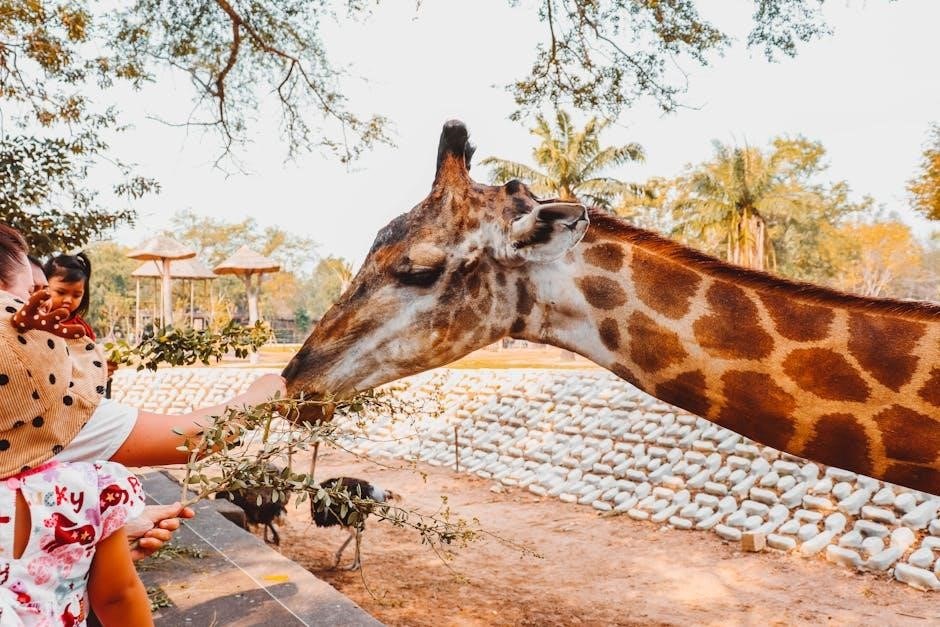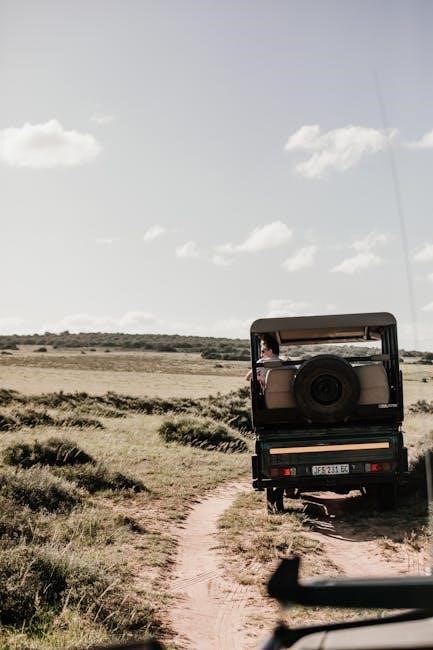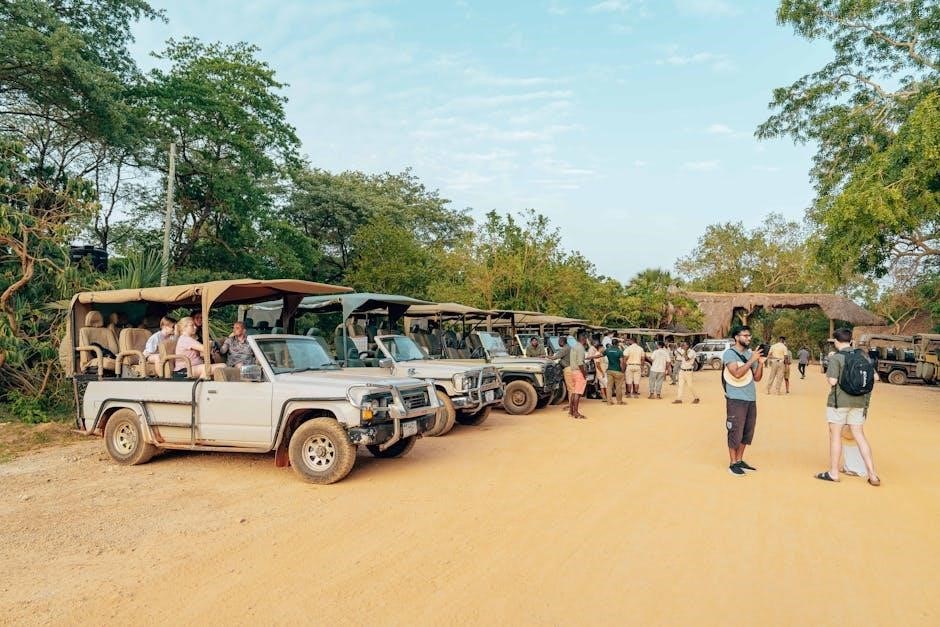Safari tourism offers an unparalleled opportunity to explore diverse wildlife, experience pristine natural landscapes, and engage with vibrant local cultures while promoting responsible and sustainable travel practices․
What is a Safari Tour?
A safari tour is an immersive journey through natural landscapes, focusing on wildlife observation, cultural interactions, and outdoor adventures․ Guided by experienced professionals, it offers a unique opportunity to explore diverse ecosystems, witness iconic animals, and engage with local communities․ Whether in Africa, Asia, or other regions, a safari tour promises unforgettable experiences, blending education, adventure, and personal growth in breathtaking environments․
Why Choose a Safari Tour Guide?
Choosing a safari tour guide ensures a safe, informed, and enriching experience․ Guides possess deep knowledge of wildlife, habitats, and local cultures, enhancing your tour with insightful commentary․ Their expertise in navigation and safety protocols allows you to focus on enjoying the adventure․ Additionally, guides often support conservation efforts and community projects, making your safari both memorable and meaningful․

Planning and Preparing for Your Safari
Effective planning ensures a seamless safari experience․ Research destinations, verify travel documents, and pack essentials like binoculars, comfortable clothing, and sun protection․
Choosing the Right Safari Destination
Selecting the right destination is crucial for an unforgettable safari experience․ Consider regions like Kenya, Tanzania, and South Africa, known for their abundant wildlife and diverse ecosystems․ Each location offers unique opportunities to witness iconic animals such as the Big Five․ Research seasonal patterns to ensure optimal wildlife viewing․ Additionally, evaluate factors like accessibility, accommodation options, and safety to match your preferences and budget․ Proper planning ensures a memorable journey․
Best Time to Go on a Safari
Timing is crucial for a successful safari experience․ The dry season, typically between May and October, offers optimal wildlife viewing as animals gather near water sources․ In regions like Kenya and Tanzania, the wildebeest migration peaks from July to September․ Plan according to your destination and interests, as seasonal variations impact wildlife behavior and accessibility․ Researching local weather patterns ensures a memorable and productive safari adventure tailored to your preferences․
Essential Documents and Requirements
Ensure you carry a valid passport, visa, and travel insurance tailored for safari adventures․ Check entry requirements for your destination, including health certificates for vaccinations․ Obtain necessary permits for specific activities or protected areas․ Research local regulations and pack essential documents securely․ Verify expiration dates and ensure all paperwork aligns with international and local guidelines to avoid delays or entry issues during your safari journey․
Safety and Emergency Preparedness
Safari safety requires preparedness, including emergency kits, reliable communication, and first aid training․ Stay informed about weather conditions and wildlife behavior to ensure a secure experience․
Safety Tips for Safari Travelers
To ensure a safe safari experience, always stay within the vehicle, maintain a safe distance from wildlife, and follow the guide’s instructions․ Be aware of your surroundings, avoid sudden movements, and keep noise levels low․ Use binoculars for close-ups instead of approaching animals․ Stay hydrated, wear appropriate clothing, and follow park rules strictly․ Listen to local guides, as their expertise is crucial for a secure and enjoyable journey․
Emergency Protocols in the Wilderness
Establishing clear emergency protocols is crucial for safari safety․ Guides are trained to handle medical emergencies, wildlife encounters, and vehicle issues․ Carry a first-aid kit, communication devices, and emergency contact information․ Stay calm, follow instructions, and remain visible․ In case of separation, return to the last known landmark․ Always inform authorities and guides about health conditions to ensure preparedness and swift response during crises․
Health Precautions for Safari Goers
Ensure vaccinations are up-to-date and consult a healthcare professional for region-specific advice․ Pack essentials like insect repellent, sunscreen, and a first-aid kit․ Stay hydrated to avoid dehydration, especially in hot climates․ Avoid consuming untreated water and opt for bottled or filtered options․ Protect against insect-borne diseases like malaria by using nets and repellents․ Carry medications for allergies or chronic conditions and inform guides of any health concerns to ensure a safe and enjoyable safari experience․
Choosing the Right Tour Operator
Selecting a reputable tour operator is crucial for a safe and memorable safari experience․ Ensure they have extensive local knowledge, a strong safety record, and commitment to sustainable practices․
What to Look for in a Safari Tour Operator
When selecting a safari tour operator, prioritize experience, safety, and sustainability․ Look for certifications, expert guides, and positive customer reviews․ Ensure they offer tailored itineraries, transparent pricing, and a focus on environmental and cultural preservation․ A reputable operator will also provide clear emergency protocols and ensure responsible wildlife interactions․ Choosing a trustworthy operator enhances your safety and contributes to conservation efforts, making your safari both enjoyable and ethical․
Types of Safari Tours Available
Safari tours vary widely, catering to diverse preferences․ Options include classic wildlife safaris, birdwatching expeditions, and adventure safaris with activities like hiking or hot air balloon rides․ Photographic safaris focus on capturing stunning images, while cultural safaris emphasize interactions with local communities․ Additionally, luxury safaris offer high-end accommodations and exclusive experiences․ Each type provides a unique way to immerse yourself in nature and culture, ensuring an unforgettable journey tailored to your interests․
Reading Reviews and Testimonials
Reading reviews and testimonials is crucial when selecting a safari tour operator․ They provide insights into past travelers’ experiences, highlighting strengths and potential drawbacks․ Look for detailed feedback on guides, accommodations, and overall satisfaction․ Genuine testimonials can help you gauge the operator’s reliability and quality, ensuring your safari experience meets expectations․ Reliable platforms like TripAdvisor or Google reviews are excellent sources for unbiased opinions․

Wildlife and Nature
Safari tourism immerses travelers in diverse ecosystems, showcasing vibrant wildlife and natural beauty, offering unique opportunities to observe and connect with nature in its purest form․
Must-See Animals on a Safari
A safari adventure offers the chance to witness the iconic Big Five: lions, elephants, buffalo, leopards, and rhinos․ Additionally, spot giraffes, zebras, hyenas, and diverse bird species․ Observing these animals in their natural habitats provides unforgettable experiences and insights into wildlife behavior, while supporting conservation efforts and responsible tourism practices․
Understanding Animal Habitats and Behaviors
Animals on safari inhabit diverse ecosystems, from savannas to forests and wetlands․ Observing their behaviors reveals survival strategies, such as migration patterns, social grouping, and predator-prey interactions․ Knowing their habitats and daily routines enhances the safari experience, allowing travelers to anticipate and appreciate wildlife encounters while respecting their natural environments and contributing to conservation efforts․
Conservation Efforts in Safari Regions
Conservation efforts in safari regions focus on protecting wildlife, habitats, and ecosystems․ Initiatives include anti-poaching programs, habitat restoration, and community engagement․ Many tour operators support these programs, with a portion of safari proceeds funding conservation projects․ Sustainable tourism practices encourage responsible wildlife viewing and environmental stewardship, ensuring the preservation of biodiversity for future generations while benefiting local communities․

Photography on Safari
Photography on safari offers a unique opportunity to capture stunning wildlife and landscapes․ It allows enthusiasts to document their experiences while adhering to responsible practices․
Best Photography Practices for Safaris
For capturing stunning safari moments, use a telephoto lens to maintain distance from wildlife․ Shoot during golden hours for optimal lighting․ Stay patient and silent to avoid startling animals․ Keep a low profile and respect the environment․ Use a tripod for stability in low-light conditions․ Always follow guides’ instructions to ensure safety and ethical practices while photographing․
Essential Photography Gear for a Safari
Packing the right gear ensures unforgettable safari memories․ A DSLR or mirrorless camera with a telephoto lens (at least 200mm) is ideal for wildlife shots․ Bring extra batteries, memory cards, and a portable charger․ A lightweight tripod and polarizing filter enhance image quality․ Dust-proof bags protect equipment from harsh conditions, while a bean bag offers stability in vehicles․ Binoculars are also handy for spotting wildlife from a distance․
Cultural Experiences
Immerse yourself in the rich traditions of local communities, learning about their customs, languages, and ways of life while fostering meaningful connections during your safari adventure․

Engaging with Local Communities
Engaging with local communities during a safari enriches your experience, offering insights into their traditions and daily life․ Guides often facilitate interactions, such as visiting villages or attending cultural performances, fostering mutual respect and understanding․ These encounters not only enhance your journey but also support local economies, promoting sustainable tourism and community development․ Such interactions create lasting memories and a deeper appreciation of diverse cultures․
Understanding Cultural Norms and Etiquette
Respecting local customs and traditions is essential during a safari․ Dress modestly, remove shoes when required, and avoid public displays of affection․ Learning a few key phrases in the local language fosters goodwill․ Guides often provide insights into cultural norms, ensuring respectful interactions․ Understanding these practices enhances your experience and creates a positive, mutually respectful atmosphere during your safari adventure․
Responsible Tourism
Responsible tourism emphasizes sustainable practices, minimizing environmental impact, and supporting conservation efforts․ It encourages travelers to respect ecosystems and local communities while enjoying their safari experiences․
The Importance of Sustainable Safari Practices
Sustainable safari practices are crucial for preserving ecosystems and biodiversity․ They ensure that tourism supports conservation efforts, protects endangered species, and promotes eco-friendly tourism․ By adhering to eco-friendly standards, tour operators help maintain pristine environments, benefiting both wildlife and local communities․ These practices also enhance the safari experience, fostering a deeper connection with nature while ensuring long-term environmental and cultural preservation․
Supporting Eco-Tourism Initiatives
Supporting eco-tourism initiatives helps protect natural habitats and fosters community development․ By choosing eco-friendly tour operators, travelers contribute to conservation projects and sustainable practices․ Eco-tourism promotes responsible travel, ensuring that wildlife thrives and local economies benefit․ It encourages ethical tourism practices, preserving natural beauty for future generations while offering enriching cultural and environmental experiences for safari-goers․

Health and Wellness
Staying fit and managing health risks is crucial for a safe safari experience․ Ensure vaccinations, carry medications, and maintain hydration to optimize wellness during your tour․
Managing Health Risks on a Safari
Prioritizing health is essential for a safe safari experience; Ensure all vaccinations are up-to-date, carry necessary medications, and stay hydrated․ Protect yourself from the sun and insects, and avoid risky behaviors․ Consulting a healthcare professional before your trip is crucial, especially for personalized advice․ By taking these precautions, you can minimize health risks and fully enjoy your safari adventure․
Staying Fit and Healthy During the Tour
Maintaining physical and mental well-being during your safari is key to an enjoyable experience․ Engage in light exercises like stretching or walking when possible․ Balanced meals and adequate rest are vital․ Stay hydrated to combat fatigue and environmental stress․ Additionally, embrace mindfulness practices to reduce stress and fully immerse in the beauty of nature surrounding you throughout the tour․

Budgeting and Cost Management
Effective budgeting ensures a stress-free safari experience․ Plan costs for transportation, accommodations, and activities․ Allocate funds wisely, prioritizing must-see destinations and essential gear to maximize your adventure within budget limits;
Estimating Costs for a Safari Tour
Estimating safari costs involves considering tour duration, destination, and type․ Research keywords like “safari budget tips” to find relevant info․ Factors include accommodation, transportation, and gear․ Costs vary by location and tour type, so compare quotes from operators․ Use advanced search tools to refine results for accurate pricing․ Plan wisely to ensure a memorable experience within your budget, avoiding hidden fees by prioritizing transparent operators․
Ways to Save Money on Your Safari
Planning ahead and booking off-season can reduce costs․ Consider group tours to split expenses․ Research operators offering discounts or packages․ Packing essentials like reusable gear avoids extra purchases․ Use advanced search techniques to find budget-friendly options․ Avoid unnecessary upgrades and focus on must-see experiences to maximize savings without compromising the safari adventure․
Safari tourism offers unforgettable experiences, blending nature, culture, and adventure․ With proper planning and awareness, travelers can embark on a life-changing journey while supporting conservation efforts responsibly․
Final Tips for a Successful Safari Experience
To ensure a memorable safari, stay informed about weather conditions, pack essentials like binoculars and sunscreen, and respect wildlife by keeping a safe distance․ Engage actively with your guide to gain deeper insights into the ecosystem․ Always follow safety guidelines and maintain a respectful attitude toward the environment and local communities․ This approach will enhance your adventure and contribute to conservation efforts․
The Future of Safari Tourism
The future of safari tourism lies in sustainable practices, emphasizing eco-conscious travel and community engagement․ As conservation efforts grow, safaris are adopting eco-friendly lodges and electric vehicles, reducing their environmental footprint․ Tour operators are increasingly supporting local economies, ensuring that tourism benefits indigenous communities․ This shift toward responsible and innovative tourism promises to preserve wildlife habitats while offering unforgettable experiences for travelers․
